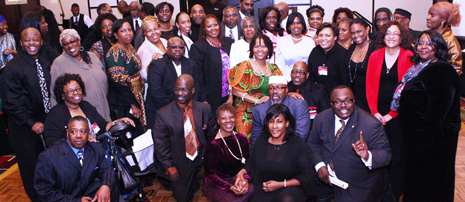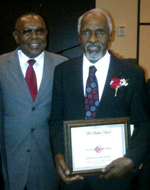Paying homage to Muhammad University and its pioneers
By Brian E. Muhammad -Contributing Writer- | Last updated: Jan 23, 2012 - 11:20:28 AMWhat's your opinion on this article?

Alumni of Muhammad University in New York gathered to honor former educators and administrators. Photo: Erick Muhammad
|
ATLANTA (FinalCall.com) - Former students of Muhammad University of Islam (MUI) of New York and Muhammad Mosque No. 7 recently reunited to honor the faculty and administrators who took the institution from a part-time school to a full-time independent learning center that serviced 1,500 students citywide, with a waiting list almost as long.
The gala was organized by the “New York Came South” group of MUI No.7 alumni, who desired to pay homage to the men and women who shaped them and sacrificed in the cause of Islam and independent education. The former students, who attended in the 1960s and the 1970s, gave out awards and citations of recognition to their teachers with a special tribute Jan. 7 to a former MUI director, formerly Brother Clark X, now Imam Muhammad Siddeeq.
During the highly spirited evening of reflections, much of the credit for the quality of MUI was given to Imam Siddeeq. Included in the acknowledgments were pre-recorded words of gratitude, love and appreciation delivered by the Honorable Minister Louis Farrakhan to his friend of over 40 years.
“My dear and beloved brother, friend and companion in struggle, Muhammad Siddeeq, I am so honored along with your longtime friend and brother … Akbar Muhammad to send you greetings and felicitations on this occasion honoring you for your wonderful service to the University of Islam and to the cause of Islam,” said Minister Farrakhan.

(L) A. Akbar Muhammad and Imam Muhammad
Siddeq
|
The Minister also celebrated the success of Imam Siddeeq’s family life in raising and educating 15 children in the way of Islam.
“I have always admired you, and when I was blessed to visit your humble home with your beloved wife and your children and to see how you both raised your children Islamically—how you met in the morning reading the Qur’an; how you sent them to school with Islam in their hearts, how the girls who competed athletically never would take off their hijab and show themselves in the public, other than as a Muslim. As long as I live, I will applaud you, your wife, your children and your efforts for the cause of Islam,” said Min. Farrakhan.
Since the 1930s, the educational legacy established by the Most Honorable Elijah Muhammad has been a hallmark of the Black American experience and a pillar in the work of Black social restoration. Mr. Muhammad built over 40 MUIs throughout the country with the strongest presence in New York City under his minister and National Representative Louis Farrakhan, who headed the Mosque No. 7 from 1965 to 1975.
The New York school was initiated as a Saturday school by Brothers Bert X and Aubrey X, according to Nation of Islam International Representative Akbar Muhammad, who was then Larry 4X, assistant minister at Muhammad Mosque No. 7. Brother Akbar Muhammad pointed out that everything they did in those years was for the growth of the “babies.”
“We have to think about the future and we have to think about producing excellence in our children,” he said, in remarks at the program.
The MUI grew from there under the spiritual guidance of Minister Farrakhan and the educational directorship of Imam Siddeeq, yielding tangible results on both students and faculty alike. He was recruited in 1967 from Buffalo, N.Y., to serve the educational program by Mosque No. 7 Secretary Maceo Hazziez and Captain Yusuf Shah.
Imam Siddeeq told The Final Call one reason that pushed expanding the education component at the time centered on the Honorable Elijah Muhammad assigning Minister Farrakhan to lead the New York mosque and giving his family the name Farrakhan.
“The Honorable Elijah Muhammad had brought him out of Boston up to New York City and gave him the name Farrakhan. He told Minister Farrakhan, after he gave him the name; you can’t have the devil, as we called him at the time, teaching Farrakhan—the children … that’s not going to work. He said once I give you a name, you can’t have the devils teaching them, you got to have Muslims teaching them,” Imam Siddeeq recalled.
Historically, this was in the volatile aftermath of the killing of Malcolm X and the firebombing of Mosque No. 7 that completely destroyed the building. With the financial backing of the Honorable Elijah Muhammad, the new structure opened in 1969, initially with the school and an enrollment of 200 to 300 students.
William Rasul, who co-hosted the affair with fellow MUI alumni Samimah Aziz, thanked his parents for their foresight to register him into the MUI.
“Parents at home and parents at school … it takes a village to raise a family—and that’s what we had. I thank my parents for taking me to the University of Islam out of the public school system,” reminisced Mr. Rasul, describing how proud he felt attending a private school that was all Black.
During the evening, several teachers bore witness to the lasting impact of working at the MUI on their careers, saying the unique and effective methods employed by the school helped them excel and benefited the field of education.
“All those wonderful theoretical things that I thought that I was going to employ from the White man’s university into Muhammad University of Islam was all transitioned once I put Elijah Muhammad spin on it through the teachings of Minister Farrakhan,” said Sister Desire Sanchez who was hired to teach at MUI two days after graduating from Boston University.
“I became a fantastic teacher because of all the things that I learned being a young teacher at the University of Islam,” she said.
A common highlight among the honorees about the MUI was the daily morning devotionals from Minister Farrakhan to the school that aired via television in each classroom—an advanced idea for the 1970s, noted Brother Akbar Muhammad. In addition, the Minister taught weekly sessions for the faculty and staff every Tuesday morning that gave direction from the vision and teachings of the Honorable Elijah Muhammad as it related to educating the children of MUI, the nation’s future. A Tuesday evening session was held for the mosque ministry class to develop helpers for the mission of Mr. Muhammad.
After being introduced by Dr. Razi Hassan, now an Alabama A&M Chemistry professor and a former New York MUI assistant director, Imam Siddeeq thanked the organizers, but turned the honor over to Allah (God) and the “outstanding leadership” of Minister Farrakhan along with the teachers who sacrificed to build MUI.
“I thank Allah for all the sacrifices that made the University of Islam so successful and such a wonderful institution,” he said. In a telephone interview, Imam Siddeeq described the school as the pride of the greater New York community.
“We were just bombarded with calls of people wanting to get in. That was right in the spirit of Black consciousness … and here right in the heart of Harlem, a Black school, independent, not getting one red cent from the government, not one dime did we get from the government,” he said. “We were able to do with a school, what no one has done.”
Imam Siddeeq said it was a “miracle,” and unprecedented before and after—subsidized or not—that a school with as large a student population as MUI was run and funded exclusively by Black people.
Over dinner, there were performances by Sister Tyree Thornton and the Giwayen Mata Dance Percussion Vocal Ensemble, live soft music from Stanley Abdul Baatin Muhammad and the MUI class song performed by the children of the Muhammad University of Islam at Muhammad Mosque No. 15 in Atlanta.
Dr. Yahaya Bello, former MUI history teacher and assistant principal, used the occasion to remind the audience of how good the MUI experience was and encouraged active support for current Islamic institutions continuing the legacy today.
“You all know the value of Islamic education. Since you know the value of education, why don’t you do like Booker T. Washington said and cast down your bucket where you are?” asked Dr. Bello.
INSIDE STORIES AND REVIEWS
-
-
About Harriett ... and the Negro Hollywood Road Show
By Rabiah Muhammad, Guest Columnist » Full Story -
Skepticism greets Jay-Z, NFL talk of inspiring change
By Bryan 18X Crawford and Richard B. Muhammad The Final Call Newspaper @TheFinalCall » Full Story -
The painful problem of Black girls and suicide
By Charlene Muhammad -National Correspondent- » Full Story -
Exploitation of Innocence - Report: Perceptions, policies hurting Black girls
By Charlene Muhammad -National Correspondent- » Full Story -
Big Ballin: Big ideas fuel a father’s Big Baller Brand and brash business sense
By Bryan Crawford -Contributing Writer- » Full Story






 Click Here Stay Connected!
Click Here Stay Connected!








